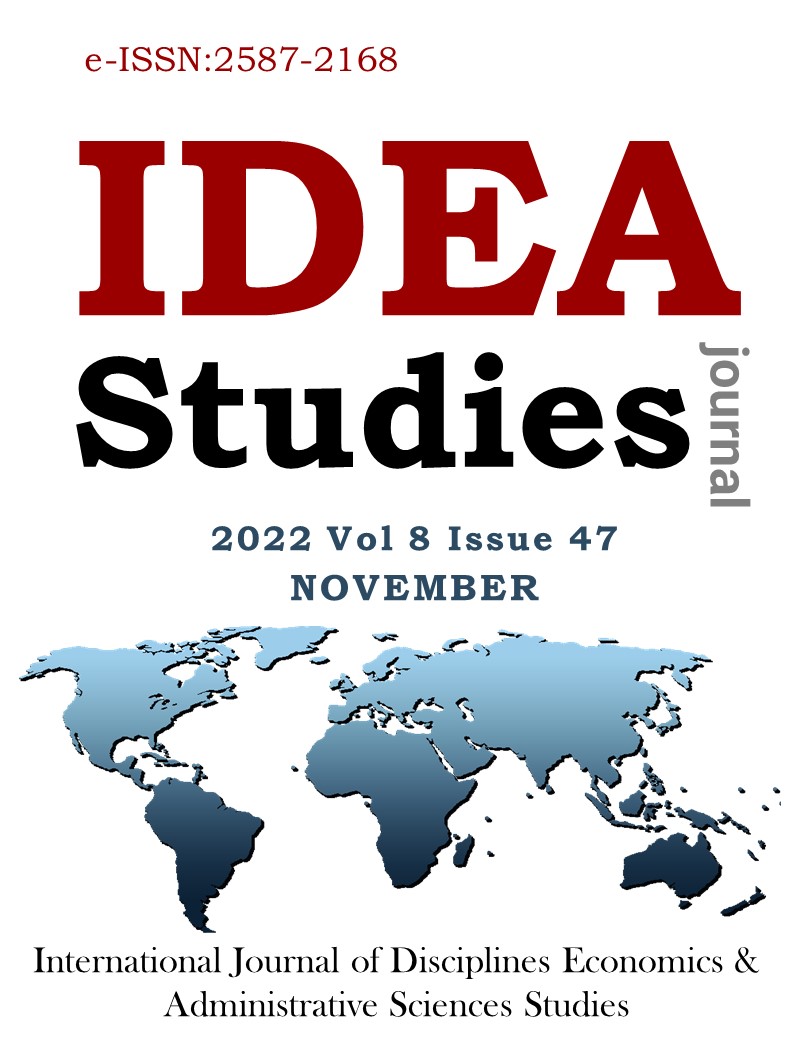Author :
Abstract
Workplace ostracism is defined as individuals being excluded or ignored by other employees. Organizational commitment, on the other hand, is the individual's identification with the organization and intra-organizational activities and their sincere commitment to them and therefore willingness to make a superior effort. The main purpose of the study is to examine the relationship between workplace ostracism and organizational commitment and to reveal how employees' perceptions of workplace ostracism have an effect on their organizational commitment. For this purpose, a survey-based research was conducted with the total participation in Trabzon University. Within the scope of this study, a survey-based field study was conducted on 148 academicians. As a result of this research, it was determined that the perception of workplace exclusion had negative effects on affective commitment, continuance commitment and normative commitment, which represent organizational commitment.
Keywords
Abstract
Workplace ostracism is defined as individuals being excluded or ignored by other employees. Organizational commitment, on the other hand, is the individual's identification with the organization and intra-organizational activities and their sincere commitment to them and therefore willingness to make a superior effort. The main purpose of the study is to examine the relationship between workplace ostracism and organizational commitment and to reveal how employees' perceptions of workplace ostracism have an effect on their organizational commitment. For this purpose, a survey-based research was conducted with the total participation in Trabzon University. Within the scope of this study, a survey-based field study was conducted on 148 academicians. As a result of this research, it was determined that the perception of workplace exclusion had negative effects on affective commitment, continuance commitment and normative commitment, which represent organizational commitment.
Keywords
- 1. Bakhshi, A., Sharma, A. D., & Kumar, K. (2011). “Organizational commitment as predictor of organizational citizenship behavior”. European Journal of Business and Management, 3(4): 78-86.
- 2. Beyza, E. (2021). Ögütsel dışlanma algısının işten ayrılma niyeti etkisinde örgütsel bağlılığın rolü”. Uluslararası Yönetim İktisat ve İşletme Dergisi, 17(1): 236-256.
- 3. Chen, Y., & Li, S. (2019). “The relationship between workplace ostracism and sleep quality: a mediated moderation model”. Frontiers in psychology, 10: 1-13.
- 4. Eickholt, M. S., & Goodboy, A. K. (2017). “Investment model predictions of workplace ostracism on K–12 teachers’ commitment to their schools and the profession of teaching”. Journal of Workplace Behavioral Health, 32(2): 139-157.
- 5. Gkorezis, P., Panagiotou, M., & Theodorou, M. (2016). “Workplace ostracism and employee silence in nursing: the mediating role of organizational identification”. Journal of advanced nursing, 72(10): 2381
- 6. Hasani, K., Boroujerdi, S. S., & Sheikhesmaeili, S. (2013). “The effect of organizational citizenship behavior on organizational commitment”. Global Business Perspectives, 1(4): 452-470.
- 7. Hejazi, M., Mahboubi, M., Keshavarzi, A., & Zinat-Motlagh, F. (2015). “Job satisfaction and organizational commitment a reflection of organizational citizenship behaviors. Journal of Science and Today's World, 4(3): 71-76.
- 8. Hitlan, R. T., Kelly, K. M., Schepman, S., Schneider, K. T., & Zárate, M. A. (2006). “Language exclusion and the consequences of perceived ostracism in the workplace”. Group Dynamics: Theory, Research, and Practice, 10(1): 56-70.
- 9. Karim, D. N., Majid, A. H. A., Omar, K., & Aburumman, O. J. (2021). The mediating effect of interpersonal distrust on the relationship between perceived organizational politics and workplace ostracism in higher education institutions. Heliyon, 7(6): 1-8.
- 10. Kumral, Tuğçe (2017). İşyeri nezaketsizliği ve örgütsel sessizlik ilişkisinde örgütsel dışlanmanın aracı rolü, Yayınlanmamış Yüksek Lisans Tezi, Marmara Üniversitesi, İstanbul.
- 11. Liu, H., & Xia, H. (2016). “Workplace ostracism: A review and directions for future research”. Journal of Human Resource and Sustainability Studies, 4(3): 197-201.
- 12. Miao, Q., Newman, A., Schwarz, G., & Xu, L. (2013). “Participative leadership and the organizational commitment of civil servants in China: The mediating effects of trust in supervisor”. British Journal of Management, 24: 76-92.
- 13. Mowday, R.T., Steers, R.M. & Porter, L.W. (1978). “The measurement of organizational commitment A progress report”. Journal Of Vocational Behavior, 14: 224 -247.
- 14. Na-Nan, K., Kanthong, S., & Joungtrakul, J. (2021). “An empirical study on the model of self-efficacy and organizational citizenship behavior transmitted through employee engagement, organizational commitment and job satisfaction in the Thai automobile parts manufacturing industry”. Journal of Open Innovation: Technology, Market, and Complexity, 7(3): 1-19.
- 15. Örücü, E., & Kışlalıoğlu, R. S. (2014). “Örgütsel bağlılık üzerine bir alan çalışması”. Uluslararası Yönetim İktisat ve İşletme Dergisi, 10(22): 45-65.
- 16. Rehman, W., Jalil, F., Hassan, M., Naseer, Z., & Ikram, H. (2021). “Workplace spirituality and organizational citizenship behavior: A mediating and moderating role of organizational commitment, and workplace ostracism”. International Journal of Innovation, Creativity, and Change, 15(3): 1121-1144.
- 17. Schaijk, S. V. (2018). The relationship between affective organizational commitment, organizational citizenship behavior and innovative behavior. In a research with extensive training and innovative organizational climate as moderators (Master thesis in Business Administration, Radboud University Nijmegen)
- 18. Sjahruddin, H., & Sudiro, A. A. (2013). Organizational justice, organizational commitment and trust in manager as predictor of organizational citizenship behavior. Interdiciplinary Journal of Contemporary Research in Business, 4(12): 133-141.
- 19. Tabachnick, B. G., & Fidell, L. S. (2013). Using multivariate statistics (6th ed.), Allyn and Bacon, Boston.
- 20. Tandon, S., Mathur, G., & Arora, S. (2022). “A study on the impact of ostracism on OCB and its relationship with organizational identification on youth in the industry”. Journal of Positive School Psychology, 6(3): 910-916.
- 21. Uslukaya, A., & Demirtaş, Z. (2020). “Öğretmen algılarına göre işyerinde dışlama: Eğitim kurumlarında nitel bir araştırma”. Eğitim ve İnsani Bilimler Dergisi: Teori ve Uygulama, 11(22): 229-256.
- 22. Wang, D., Qin, Y., & Zhou, W. (2021). “The effects of leaders’ prosocial orientation on employees’ organizational citizenship behavior-The roles of affective commitment and workplace ostracism”. Psychology Research and Behavior Management, 14: 1171-1185.
- 23. Zheng, X., Yang, J., Ngo, H.Y., Liu, X.Y. & Jiao, W. (2016). “Workplace ostracism and its negative outcomes: psychological capital as a moderator”. Journal of Personnel Psychology, 15(4): 143-151.





